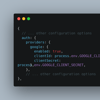A couple of times I have been asked "How would you do X in functional programming?" I absolutely love these types of questions.
I do my best to answer every question, but I think there are many questions interesting enough to warrant their own articles.
So for this article I would like to demonstrate how I could recreate this imperative function in a more functional manner.
This function has an if statement without an else. So while a ternary operator could work, it is not ideal.
// A basic redux-thunk action that only dispatches when value exists
const someAction = value => dispatch => {
const item = getItem(value)
if (item != null) {
dispatch({ type: 'ACTION', item })
}
}
Here we need to run dispatch only when we have a value, otherwise we do nothing.
One option is to use a short circuit operator:
// short circuit
const someAction = value => dispatch => {
const item = getItem(value)
item && dispatch({ type: 'ACTION', item })
}
// ternary
const someAction = value => dispatch => {
const item = getItem(value)
item ? dispatch({ type: 'ACTION', item }) : null
}
Short circuit and ternary and both ways you can solve this problem, but let's take a look at a couple more.
Solution A: ifVal Helper Function
To do this in a more functional way, I will create a helper function. I'll write this helper old school first then boil it down piece by piece so everyone can understand it easily.
// 1: old school
function ifVal (x, f) {
if (x == null) {
return null
} else {
return f(x)
}
}
// 2: convert to arrow function
const ifVal = (x, f) => {
if (x == null) {
return null
} else {
return f(x)
}
}
// 3: convert if/else to a ternary operator
const ifVal = (x, f) => {
return x == null ? null : f(x)
}
// 4: voilà!
const ifVal = (x, f) => x == null ? null : f(x)
Now we can modify our someAction function to use ifVal instead of the classic if block.
// functional alternative
const someAction = value => dispatch =>
ifVal(getItem(value), item => dispatch({ type: 'ACTION', item }))
Here's the comparison for a quick and easy twitter screenshot:
/**
* execute the function if the value is not null or undefined
* @param {Object} val - the value to test
* @param {Function} fn - the function to execute.
* @returns {Object} - null or the value of the executed function.
*/
const ifVal = (val, fn) => val == null ? null : fn(val)
// imperative example
const someAction = value => dispatch => {
const item = getItem(value)
if (item!= null) {
dispatch({ type: 'ACTION', item })
}
}
// functional example
const someAction = value => dispatch =>
ifVal(getItem(value), item => dispatch({ type: 'ACTION', item }))
Further reading
Take a look at Ramda's when, unless, and ifelse for other useful and similar functions.
Solution B: Functors
We could also use the Maybe Type. The Maybe Type consists of either a Just type which holds a value or a Nothing type which is exactly what is says.
For this example, I'll use the Maybe Type from the Sanctuary library.
It looks a little like this:
/* Examples of Sanctuary's Maybe */
toMaybe(null) //=> Nothing
toMaybe(undefined) //=> Nothing
toMaybe(0) //=> Just(0)
toMaybe(false) //=> Just(false)
toMaybe(123) //=> Just(123)
toMaybe({ name: 'joel' }) //=> Just({ name: 'joel' })
The Maybe Type is pretty simple and the reason why I want to use it is because map and Maybe work together so well, it was been given a special name, a Functor.
Some libraries like ramda-fantasy have a fluent syntax, but this article is using Sanctuary. Though, it is good to know that these two are equivalent.
const double = x => x * 2
// ramda-fantasy
Maybe.toMaybe(333).map(double) //=> Just(666)
// Sanctuary
map(double, toMaybe(333)) //=> Just(666)
Examples:
const double = x => x * 2
// map is ignored
map(double, toMaybe(null)) //=> Nothing
// no more null exceptions!
map(val => val.something(), toMaybe(null)) //=> Nothing
// map is mapped
map(double, toMaybe(333)) //=> Just(666)
All together doSomething with the Maybe will look like this:
import { toMaybe, map } from 'sanctuary'
const someAction = value => dispatch => {
const item = getItem(value)
const maybeValue = toMaybe(item)
map(item => dispatch({ type: 'ACTION', item }))(maybeValue)
}
Here we have three functions, getItem, toMaybe and map that can be composed together into a new single function. We can pass value into that new function and it will flow through first into getItem, then toMaybe and finally that value will flow into our map.
const someAction = value => dispatch => pipe([
getItem,
toMaybe,
map(value => dispatch({ type: 'ACTION', value })),
], value)
And for one last picture perfect Tweet:
import { toMaybe, map, pipe } from 'sanctuary'
// imperative example
const someAction = value => dispatch => {
const item = getItem(value)
if (item != null) {
dispatch({ type: 'ACTION', item })
}
}
// maybe functor example
const someAction = value => dispatch => pipe([
getItem,
toMaybe,
map(value => dispatch({ type: 'ACTION', value })),
], value)
someAction(666)(dispatch) // Action is dispatched!
someAction(null)(dispatch) // Nothing happens
End
I hope you enjoyed this small functional journey. Let me know in the comments if you did, if you got lost, if you have any questions, or if you want more articles like this one. If you really want to motivate me, follow me here or Twitter and if you loved this article, pass it around!
Cheers!






Latest comments (11)
Thank you for sharing! Very nice read!
Glad you enjoyed this! Cheers 🍻
I tend to use function I call
safe:const safe = f => x => x && f(x)for these purposes. I just wrap all my functions that don't expect null/undefined into it.
The functional paradigm is not about abolishing all syntax (
if,const) and being directly mappable to lambda calculus. The functional paradigm is about immutability and about avoiding side-effects. And your code, essentially, is all about side-effects - you don't use the return value offoo.action(), you call it for it's side-effect.As long as you don't amend
foo.action()to return something instead of doing a side-effect - you are not really doing functional programming. No matter how much lipstick you put on it - it's still a pig.What you saying is correct, but what you are missing here is that this is a contrived example. And this is the problem with all contrived examples.
The purpose of a contrived example is to demonstrate a technique. So you fabricate an example to demonstrate the technique.
The major problem with contrived examples as you have pointed out is there is always a better way to solve the example provided.
So I could have come with up a better example such as a
redux-thunk:Though, I attempted to contrive the example from real questions I have been asked.
And without fail someone will still point out a better way to solve this newer example too.
Unfortunately, recommended changes to the initial example will typically remove any demonstration of the techniques.
So I completely agree with you that the side effects are bad. Though this article is not about managing side effects.
Clearly one of my weak points is creating contrived examples and if anyone has a better example that can demonstrate these techniques, I will promptly update this article.
Until then, Cheers!
My point is that the imperative nature of the task you are trying to perform is making you use things like the comma operator that should have no place in functional programming.
It's easy to make the example fit functional programming by making
foo.actionreturn something, and makingdoSomethingreturn the result offoo.action(item)if the item exists andnullif it doesn't:Yes that is definitely a better example to start with. And again, I am in agreement with you.
I had come up with that initial imperative example based on the questions I was asked on another article I had written:
There seemed to be a theme forming so I attempted to come with with an example that held true to their original questions.
While that other article was simply to demonstrate how a ternary operator could replace all instances of
if/else, I also didn't provide any functional alternatives.So I guess you can see how this awkward example was born.
Cheers!
Javascript is an imperative language, with some features that allow functional programming. Quite a few libraries (like Sanctuary that you have mentioned) were written to levitate these features into a functional ecosystem - but it still looks forced compared to languages like Haskell that were created for FP, or even languages like Rust that were created with FP support in mind.
Notice that in the first two responses you have linked to (I'll touch the third one later) the
ifstatement was used to do side-effects - mutate a variable or call a function without using it's return value. Side-effects are imperative programming - functional languages usually try to avoid them - or at least discourage them or work around them.So, what you are trying to do is do an imperative task using a functional API that was forced on an imperative language's syntax. I would be surprised if it didn't turn out awkward...
Now, let us look at the examples from the responses to your article:
Example One
(purely functional random number generation is a bit complex, so let's ignore that part for a moment)
If I were to rewrite this into functional programming using the ternary operator, I would do this:
We are doing FP - the point is not to mutate
i, the point is to bindito the result we want. Since JS does not support shadowing, I renamed the original value to something else.Example Two
In this case, I don't know what
doSomething()does so I can't make it functional - but you can be sure it involves rewritingdoSomething()to return a value instead of doing a side-effect. Asking what's the functional way to do a side-effect is like asking what's the vegan way to slaughter a cow - the answer is "you simply don't".Example Three
This, of course, needs to be put into context. What are you returning from? What would you have done had you not returned here? What would be returned otherwise?
In your reply you have given such context - but that context is a side-effect, and as I've been arguing repeatedly - side-effects don't fit well into the functional style!
Now, if the context was a more pure function:
We could have used a ternary operator:
Simple enough. But as someone commented - what if you have multiple statements?
For example:
Well, in functional programming you don't have "statements" - only declarations and expressions. Proper functional syntax allows you do declarations inside expressions. For example, in Haskell:
Javascript is not a functional language so you can't do a declaration in the middle of a statement (well, you can if you open a function just to call it, but let's not get into this...). So let's utilize that Sanctuary library:
See what I did there? I've rewritten a bunch of statements that work by mutating a variable into a series of expressions where each expression's value gets fed into the next expression as an argument. This is not just forcing imperative flow into functional syntax - I've actually converted the flow itself to be functional. And this is why I could fit it into a ternary operator.
These are all excellent solutions!
Based on your feedback I have reworked this article. I have come up with a (slightly) better example and eliminated the comma operator as well as tap.
Thank you for your feedback!
Cheers!
I would have kept the
getItempart. Without it, it's unclear why you can't just do this:Examples updated!